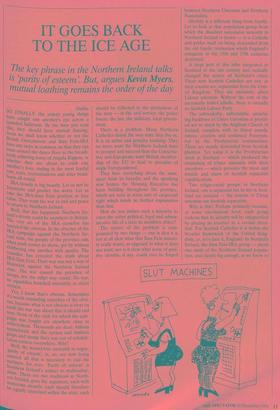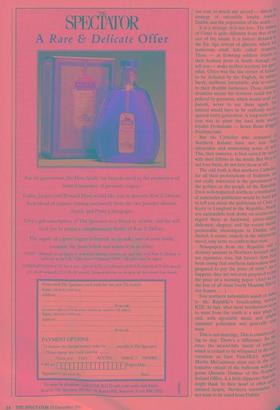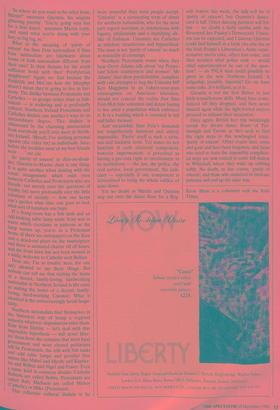IT GOES BACK TO THE ICE AGE
The key phrase in the Northern Ireland talks
is `parity of esteem'. But, argues Kevin Myers,
mutual loathing remains the order of the day
Dublin SO- FINALLY the ardent young things have caught one another's eye across a crowded ballroom. By the time you read this, they should have started dancing. Soon we shall know whether or not the British Government and Sinn Fein-IRA have any steps in common, so that they can swan around the dance floor to the breath- lessly admiring tones of Angela Rippon, or Whether they are about to crush one another's toes, ending in the most fearful
limy, tears, recriminations and utter beast- liness all round. IRA beastly is big beastly. Let us not be Jeremiahs and predict the worst. Let us take the IRA-Sinn Fein position at face value. They want the war to end and peace to return to Northern Ireland. Well, that has happened. Northern Ire- land's streets could be anywhere in Britain. The very act of the IRA ceasefire has reve IRA campaign the obvious. In the absence of the 'AA campaign against the Northern Ire- land state, the people of the province can, When push comes to shove, get by without Clobbering one another with spades. The ceasefire has revealed the truth about IR-A-Sinn Fein. Their war was not a war of liberation against the Northern Ireland state. The war caused the presence of troops, not the other way round. No war, flO squaddies hunched miserably at street corners.
Yes, I know that's obvious. Sometimes It's worth reminding ourselves of the obvi- °us, because what is not obvious is what on earth the war was about that it should end ueW. None of the ends for which the cam- Palp was fought are anywhere close to achievement. evement. Thousands are dead, billions squandered, and the eyeless and limbless grope and stump their way out of rehabili- tation centres everywhere. Why? Well, the weasel-bite currently in vogue, Parity of esteem', is, we are now being assured, all that is necessary to end the nastiness for ever. 'Parity of esteem' is Northern Ireland's answer to multicultur- alism. There are two traditions in North- ern Ireland, goes the argument, each with be strands; each should therefore be equally cherished within the state, each should be reflected in the institutions of the state — in the civil service, the police forces, the law, the judiciary, local govern- ment.
There is a problem. Many Northern Catholics detest the very state they live in. It is an active and genuine loathing. They no more want the Northern Ireland state to prosper and succeed than the Conserva- tive anti-Europeans want British member- ship of the EU to lead to paradise of single Europeanhood. They hate everything about the state, apart from its benefits and the spanking new homes the Housing Executive has been building throughout the province, which are seen as some sort of cargo-cult right which needs no further explanation than that.
How do you induce such a minority to enter the active political, legal and admin- istrative life of a state its members abhor?
The nature of the problem is com- pounded by two things — one is that it is not at all clear what that Sinn Fein minori- ty really wants, as opposed to what it does not want; nor is it clear what sense of posi- tive identity, if any, could ever be forged between Northern Unionists 'and Northern Nationalists.
Identity is a different thing from loyalty. Let us look at that population group from which the dissident nationalist minority in Northern Ireland is drawn — it is Catholic and prides itself on being descended from the old Gaelic civilisation which England's conquests in the 15th and 17th centuries destroyed.
A large part of this tribe emigrated to Scotland in the last century and radically changed the nature of Scotland's cities. These now Scottish Catholics are not, as their cousins are, separatists from the Unit- ed Kingdom. They are unionists, albeit Labour unionists. Without the vote of the ancestrally Irish-Catholic, there is virtually no Scottish Labour Party.
The unbreakable, unbendable, unyield- ing backbone of Ulster Unionism is provid- ed not so much by the Anglican Church of Ireland, complete with its fluted vowels, mitres, croziers and costumed Puseyism, but by the Presbyterian communities. These are mostly descended from Scottish planters. Yet today it is the Presbyterian stock in Scotland — which produced the staunchest of Ulster unionists with their ancestors — which provides the meat and muscle and sinew of Scottish separatist republicanism.
Two religio-racial groups: in Northern Ireland, one is separatist but its kin in Scot- land are unionist — the cousins of Ulster unionists are Scottish separatists.
Why is this? Perhaps primarily because, at some unconscious level, each group reckons that its identity will be safeguarded by placing its loyalties in a certain direc- tion. For Scottish Catholics it is within the broader framework of the United King- dom, or, let's face it, England. In Northern Ireland, the Sinn Fein-IRA group — about one ninth of the Northern Ireland popula- tion, and clearly big enough, as we know to our cost, to wreck any accord — directs its strategy of ostensible loyalty towards Dublin and the population of the south. It is a strategy. It is not love. The historY of Ulster is quite different from that of the rest of the island. It is history dictated by the Ice Age retreat of glaciers, which left numerous small hills called drumlins' These — as frowning soldiers frozen ld their lookout posts in South Armagh ean tell you — make perfect territory for go; rillas. Ulster was the last corner of Irelana to be defeated by the English, its natives hardy, stubborn, intractable, able to retreat to their drumlin fastnesses. Those damned drumlins meant the territory could not be policed by garrisons, which would send ald patrols, never to see them again, bid instead would have to be endlessly recoil" quered every generation. A long-term sal!' tion was to plant the land with sturaY loyalist Protestants — hence those dogged Presbyterians. But the Catholics who remained l.11 Northern Ireland have not lost thef intractable and unswerving sense of sell' This, they conceive, is best served by union with their fellows in the south. But they dd not love them, do not love them at all. The odd truth is that northern Catholics' for all their protestations of Irishness, are not really interested in the government (fr the politics or the people of the Republic' Even well-respected northern constitution- al nationalist politicians would be hard put to tell you about the politicians of Clare or Kerry or Longford in the Republic. North' e nationalists look down on southernefs m ' regard them as backward, priest-ridden' dishonest, slippery; and the recent incddi' prehensible shenanigans in Dublin, ducted, it seems, entirely in the subjunctive mood, only serve to confirm that view. Newspapers from the Republic sell derisory amount in Northern Ireland: tile,Y are expensive, true, but haven't Sinn Fedie been saying that northern nationalists we% prepared to pay the price of unity? As 1 happens, they are not even prepared to psY, the price of a morning paper. (And as f()" the loss of all those lovely Housing Exec° tive homes . . . ) Few northern nationalists watch or lis.tceri to the Republic's broadcasting servic,,,' RTE. In fact, what most northerners see".0 to want from the south is a nice p/acektie visit, with agreeable music and affnu, unarmed policemen and generally e3'' ways. This is not marriage. This is cousins eadi,; ing to stay. There's a difference. So tin, issue, the weasel-bite 'parity of csteetnn: which is certain to be whispered in the cd versation as Sinn Fein-IRA's wingr:si Martin McGuinness steps out in the 7-1`r, tentative circuit of the ballroom with ern geous Quentin Thomas of the Norie Ireland Office, is a little slipperier than °e%, might think. In their heart of often inri do amined hearts, Northern nationalists not want to be ruled from Dublin. 'So where do you want to be ruled from, Martin?' murmurs Quentin, his sequins glittering prettily. 'You're going very fast for a first dance,' murmurs Martin coyly, and mind what you're doing with your feet, ye big lug, ye.' What is the meaning of 'parityof esteem' for Sinn Fein nationalism if Sinn Fein nationalists are lukewarm about forms of Irish nationalism different from their own? Is their distaste for the south sufficient bond with their Presbyterian neighbours? Again, no. Just because the Hatfields and McCoys hate the Murphys doesn't mean they're going to live in har- al°11Y. The dislike between Protestants. and Catholics — as groups rather than as indi- viduals — is enduring and is profoundly cultural. Northern Ireland Protestants and Catholics disdain one another's ways to an extraordinary degree. This disdain obfuscated by the charming asseverationis from everybody you'll ever meet in North- ern Ireland, `Myself, I've nothing personal against (the other lot) as individuals. Sure, before the troubles most of my best friends were . . . 'etc. etc. So 'parity of esteem' in chin-on-shoul- der, Quentin-to-Martin chats is one thing. It is quite another when dealing with the social antagonisms which exist even between Catholics and Protestants who are friends, not merely over the questions of loyalty, but more profoundly over the little talismans of identity how one keeps one's garden what time one goes to bed, What sort of furniture one buys. If a living-room has a fish tank and an odd-looking table lamp made from wax in water which circulates in patterns as the lamp warms up, you're in a Protestant home. If there are newspapers on the floor and a. dried-out plant on the mantelpiece and there is animated chatter till all hours, and the front lawn has not been mowed in a While, welcome to Catholic west Belfast. Dear me, I'm in trouble here, for one Isn't allowed to say these things. But nobody can tell me that visiting the home Of a decent, family-loving, hardworking nationalist in Northern Ireland is the same as visiting the home of a decent, family- hard-working Unionist. What is identical is the embarrassingly lavish hospi- tality.
Northern nationalists find themselves in the historical trap of being a regional minority whatever dispensation rules them. from Dublin — let's deal with that impossible hypothesis — will never liber- ate them from the certainty that most local gevernment and most elected politicians Will be Protestants, the folk with fish tanks and odd table lamps and peculiar first _names like Mabel and Myrtle and Kimber- ley and Wilbur and Nigel and Fraser. Even a_ name held in common divides: Catholic Roberts are called Bobby, Protestants are called Rab; Michaels are called Mickey (Catholic) or Mike (Protestant). This reflective cultural disdain is far more powerful than most people accept, 'Unionist' is a coruscating term of abuse for northern nationalists, who for the most part regard unionism as synonymous with bigotry, philistinism and a mystifying dis- like of Irishness. Unionists see Catholics as indolent, treacherous and hypocritical. The issue is not 'parity of esteem' so much as mutuality of contempt.
Northern Protestants vomit when they hear Gerry Adams talk about 'my Protes- tant fellow countrymen and women'. Mr Adams' chat-show psychobabble, complete with vain attempts to hug the Unionist MP Ken Magginnis in an I-share-your-pain extravaganza on American television, should not conceal the reality that Sinn Fein-IRA hate unionism and detest having to live amid a population which embraces it. It is a loathing which is returned in full and fuller measure.
And meanwhile Sinn Fein's demands are magnificently innocent and utterly impossible. 'Parity' itself is such a virtu- ous and laudable term. Yet states do not function if each electoral component, however impermanent, is perceived as having a pro-rata right to involvement in its institutions — the law, the police, the civil service, local government, the judi- ciary — especially if one component is determined to bring the whole edifice of state down.
Yet no doubt as Martin and Quentin step out onto the dance floor for a Bog- side foxtrot this week, the talk will be of 'parity of esteem'; but Quentin's dance- card is full. Other dancing partners will fol- low — no doubt a hefty rumba with the Reverend Ian Paisley's Democratic Union- ists can be expected, and I daresay Quentin could find himself in a brisk cha-cha-cha as the Irish People's Liberation's Army repre- sentative snorts coke, offers him some, and then wonders what police rank — would chief superintendent be out of the ques- tion? — an INLA man could possibly be given in the new Northern Ireland. A judgeship, possibly, Quentin? Go on, have some coke. It's brilliant, so it is. . .
Quentin is not the first Briton to test Irish terpsichorean skills. Many have come, danced till they dropped, and then never danced again while the light-footed natives proceed to exhaust their successors.
Once again, British feet trip twinklingly across the dreary dance floors of Fer- managh and Tyrone as they seek to find the right steps to this newfangled craze, `parity of esteem'. Other crazes have come and gone and have been forgotten, and those who tried to learn the impossibly complicat- ed steps are now retired to some hill-station in Whitehall, where they wake up sobbing softly. No doubt, in due course, 'parity of esteem', and those who mastered its intricate patterns, will end up the same way.
Kevin Myers is a columnist with the Irish Times.




































































 Previous page
Previous page